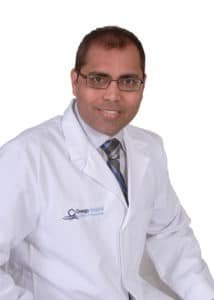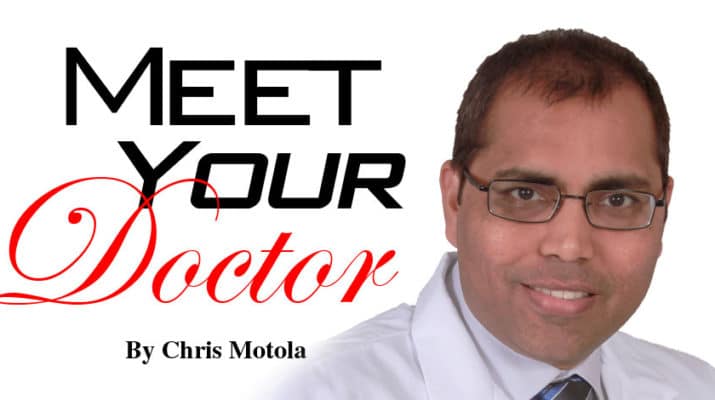General surgeon in Oswego discusses how the pandemic has changed the way he practices
By Chris Motola

Q: How would you describe your role at Oswego Health?
A: I’m a general surgeon. I joined Oswego Hospital in 2014. I’m a local resident now and live here with my wife and our 6-year-old son and 4-year-old daughter. I did my medical residency in Westchester Medical Center. After that I came to Oswego Hospital. I do almost all kinds of general surgical procedures but my focus is more on laparoscopic surgeries, as well as general surgical procedures like skin biopsies, lumps and bumps and all those.
Q: How has the COVID-19 pandemic changed the way you practice?
A: What we’re doing now is seeing patients, bringing them into the operating room, and do the procedures on them. But let’s say someone is at home and experiencing gall bladder pain, we’ll be doing telemedicine with them. If they do need surgery, we bring them into the operating room and perform the surgery.
Q: Elective surgeries are beginning to be allowed again. Can you give us some examples of elective surgeries?
A: What would be considered an elective surgery would be someone who has had a hernia for a long time and it’s not really bothering him or her that much. So those kinds of surgeries are more elective surgeries, which are not emergent or life-threatening. Sometimes those kinds of things can become life-threatening or at least emergent. In that case they do come to the emergency room. But in terms of elective surgery in my practice, someone has a skin lesion, lump or bump, but they aren’t cancer, then the patient may want to get rid of them, but they aren’t emergent or life-threatening. Those are elective.
Q: How has Oswego Health sorted patients into each category?
A: So, yes, all elective surgeries were canceled. So basically what we do is see the patient with telemedicine, and if a patient needs elective surgeries, what I’m doing is putting them on a list. Once we start doing elective surgeries, we’ll call them and start scheduling them for the surgery. But if someone does need examination — because we only have limited examination options through telemedicine — then I’ll bring them to my office and examine them there, taking all the precautions that we need to take with COVID-19. But someone with an abscess can’t wait for a month or two. In the beginning, we didn’t even know how long the lockdown might go. So, it’s mostly emergent procedures we’re doing in terms of the OR. As a general surgeon, I’m on call to take patients in the emergency room, but in terms of the office, I’m making a list to schedule patients for elective surgeries when we can.
Q: How has the crisis affected your views on the effectiveness or limitations of telemedicine?
A: Telemedicine is actually very effective. I would say I wasn’t really using telemedicine at all before. Yes, I would answer patients’ calls and answer their questions, but I wasn’t doing any telemedicine. So, we started doing it when this started, and I found it to be very effective. Many times patients don’t need to come to hospital unless they need a detailed exam. It’s not the best, because the examination can’t be as good, but at least under the current circumstances, it’s the best thing we could do.
Q: What kinds of stresses has the disease itself put on your department?
A: We are still taking care of our community, so if a patient needs any emergent surgeries, they’re getting it done. I have told patients if they have any questions to call me and, if they need surgery, they’ll get it. So, in that regard, I don’t think there’s been that much impact. We do only have one operating room running right now, though, as opposed to the normal four. So there can be some wait because of that. I think the patients have been cooperative and understanding for us to open up again.
Q: Has the use of telehealth affected your work-life balance? How do you determine when you’ll be available?
A: Because the volume is not that much, I am available pretty much all the time. And that’s because we’re not doing elective surgery. Before I did have designated days and hours, but I don’t have that right now. So I’m available more for telemedicine now than ever before. As a general surgeon in a community setting, I want to assure that patients will be taken care of in every aspect.
Lifelines
Name: Jai Singh, M.D.
Position: General Surgeon at Oswego Health
Hometown: New Delhi, India
Education: University of Delhi (medical school); Westchester Medical Center (residency)
Affiliations: Oswego Health
Organizations: American College of Surgeons; Society of American Gastrointestinal and Endoscopic Surgeons
Family: Wife, son (6), daughter (4)
Hobbies: Time with family

